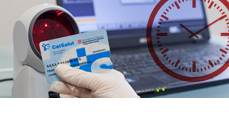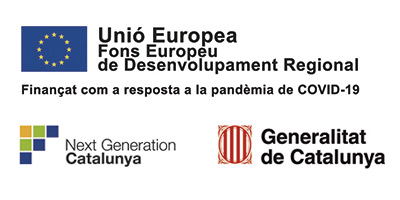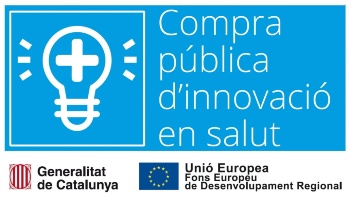Services
Services
Clinical Services i
Clinical Services i
Presentation
In October 2015 the Population program for early detection of colon and rectal cancer of the Department of Health in the Vallès Occidental. In this region, the Program is coordinated by theParc Taulí Cancer Technical Screening Office. It is aimed at men and women between 50 and 69 years old.
Colon and rectal cancer is the most common in all men and women in Catalonia, with more than 6.000 new cases each year. Colon cancer has a similar frequency in men and women, while rectal cancer is more common in men. Approximately 13.000 men and 14.000 women live with a diagnosis of colorectal cancer in Catalonia.
Colon and rectal cancer is also the second leading cause of death from cancer in Catalonia. Survival is higher or lower depending on the stage of tumor evolution at the time of diagnosis.
Early detection of colon and / or rectal cancer has been shown to reduce mortality from this type of tumor..
On cancer of the colon and rectum
What is the function of the colon and rectum?
The colon and rectum is a tubular organ known as the large intestine located in the abdomen. It is part of the digestive tract and its function is to absorb water and form and eliminate waste.
The large intestine is not an indispensable organ for living; when necessary, as in the case of a tumor, large portions or the entire intestine can be removed without compromising survival.
How does colon and / or rectal cancer develop?
Most colon and / or rectal cancers develop from adenomatous polyps that grow into the lumen of the gut. The presence of polyps is common in the population and only a small percentage progress to cancer.
The average time required to complete this progression is long, probably 10 years or more, which allows for the prevention or early detection of colon or rectal cancer and improve its prognosis.
What signs and symptoms does it give?
There are obvious signs or symptoms that may suggest their presence, in front of which you should consult your doctor:
- Red blood on stools
- Changes in bowel habits for more than six weeks
- Unexplained weight loss
- Unexplained tiredness
- Persistent abdominal discomfort
Most of the time, however, the cancer does not produce any obvious signs or symptoms until the disease is advanced. However, polyps, and cancer in the early stages, can bleed intermittently, without this blood being obvious to the naked eye, is what we call 'fecal occult blood'.
Early detection of colon and / or rectal cancer and its importance
The fecal occult blood test makes it possible to identify these small losses that are not visible to the naked eye.
With the help of colonoscopy - which will be done only if necessary, to complete the study - these lesions can be diagnosed early before they produce symptoms, and this is when the treatment has the most guarantees of success both in short as well as long term, improving the prognosis and preserving the quality of life.
Early detection of colon and / or rectal cancer and detection and removal of polyps has been shown to reduce mortality from this type of tumor.
Can other types of prevention be done?
Known risk factors suggest other prevention actions that may decrease the risk of developing colon and / or rectal cancer, such as:
- Regular exercise.
- A diet rich in fruits and vegetables.
- A controlled consumption of red or processed meats and animal fats.
-
Total abstinence from smoking.
How does the Program work?
The Program is addressed to men and women aged 50 and 69 years with a health card, and consists of making, every two years, a simple and comfortable test at home to detect if the stools contain small amounts of blood that are not visible to the naked eye.
-
When the Program reaches your municipality or area, according to the established schedule, the entire target population receives one at home letter, along with an information leaflet and a list of pharmacies in your area.
-
They have to wear this one letter to one of the listed pharmacies so that they give him the test and instructions for performing it.
-
Once the test is done, it should return to the pharmacy. The results of the test will be communicated to you by letter or telephone.
-
It is important to participate in the Program within the deadlines established for each municipality or area, and which are indicated in the letter.
Important aspects of the test
-
Do not perform the test if you have bleeding hemorrhoids or menstruation until 3 days have passed without blood loss.
-
Avoid contamination of feces with urine.
-
It is not necessary to be fasting or follow any diet before performing the test.
-
Taking medication does not interfere with performing the test.
-
Do not ingest the liquid from the tube. If the liquid comes in contact with the eyes, mouth or skin, rinse with plenty of water and, if necessary, consult a doctor or pharmacist.
-
Communicate the loss of the test or any obstacle that has arisen during the performance of the same to the pharmacist, who will tell you how to act, or call directly to the Technical Office of Cancer Screening.
Before going to the pharmacy, it is important to contact the Cancer Screening Technical Office if you have:
-
Colon or rectal disease (large intestine) already diagnosed, treated or followed up, more specifically colorectal cancer, colorectal adenoma or inflammatory bowel disease.
-
Total colectomy (removal of the colon).
-
Colonoscopy performed in the last 5 years.
-
Digestive symptoms (blood in stools, diarrhea, constipation, abdominal pain ...) not studied. The study of symptoms should be done by a doctor who should visit the patient and determine the most appropriate diagnostic tests in each situation.
-
Some relatives diagnosed with:
-
Family history of familial adenomatous polyposis or other polyposis syndromes;
-
History of hereditary colorectal cancer not associated with polyposis (Lynch syndrome);
-
Two or more first-degree relatives (parents, children and siblings) with colorectal cancer or a first-degree relative (parents, children and siblings) with colorectal cancer diagnosed before the age of 60.
Attention and location devices
Cancer Screening Technical Office (Parc Taulí Health Corporation) - Coordinator of the Program for the early detection of colon and rectal cancer for the whole of the Vallès Occidental
Digestive Endoscopy Unit of the Parc Taulí Health Corporation
Digestive Encoscopy Unit of the Terrassa Health Consortium
Digestive Endoscopy Unit of Mútua Terrassa
Deployment calendar in the Vallès Occidental 2015-2017
| Any | Municipality and area | Reference hospital | Target population | Indicative start date | State |
|---|---|---|---|---|---|
| 2015 | Castellar del Vallès -St. Lawrence | Parc Taulí | 6.231 | 1/10/2015 | Closed |
| Sabadell 4B Can Rull | CS Terrace | 4.928 | 16/11/2015 | Open | |
| Sabadell 4A Concord | Parc Taulí | 4.079 | 16/11/2015 | Open | |
| 2016 | Polinyà / Sentmenat | Parc Taulí | 3.300 | 11/01/2016 | Open |
| Sabadell 2 Creu Alta | Parc Taulí | 6.121 | 08/02/2016 | Open | |
| Sabadell 3A Ca n'Oriac | Parc Taulí | 4.659 | 21/03/2016 | Open | |
| Sabadell 3B North | Parc Taulí | 3.884 | 25/04/2016 | ||
| Sabadell 1A Center | Parc Taulí | 7.905 | 23/05/2016 | ||
| Sabadell 7 La Serra and Poblenou | Parc Taulí | 1.723 | 18/07/2016 | ||
| Sabadell 1B Sant Oleguer | Parc Taulí | 4.864 | 06/09/2016 | ||
| Sabadell 5 Gràcia and Can Feu (Merinals) | Parc Taulí | 4.212 | 10/10/2016 | ||
| Sabadell 6 Barberà-Sud Cross | Parc Taulí | 6.493 | 07/11/2016 | ||
| 2017 | Barberà del Valles | Parc Taulí | 7.638 | 09/01/2017 | |
| Bay City | Parc Taulí | 3.425 | 01/03/2017 | ||
| Cerdanyola del Vallès 1 | Parc Taulí | 6.898 | 27/03/2017 | ||
| Cerdanyola del Vallès 2 | Parc Taulí | 6.321 | 15/05/2017 | ||
| Cerdanyola-Ripollet | Parc Taulí | 2.773 | 26/06/2017 | ||
| Ribeye 1 | Parc Taulí | 4.012 | 17/07/2017 |
|
|
| Ribeye 2 | Parc Taulí | 2.881 | 18/09/2017 |
| Any | Municipality and area | Reference hospital | Target population | Indicative start date | State |
|---|---|---|---|---|---|
| 2016 | Sant Cugat del Vallès 3 | Mutual Society Terrassa | 4.345 | 18/01/2016 | Open |
| Sant Quirze del Vallès | CS Terrace | 4.462 | 22/02/2016 | Open | |
| Sant Cugat del Vallès 2 | Mutual Society Terrassa | 7.972 | 29/02/2016 | Open | |
| Ruby 2 (Castellbisbal) | CS Terrace | 9.336 | 25/04/2016 | ||
| Sant Cugat del Vallès 1 | Mutual Society Terrassa | 6.775 | 23/05/2016 | ||
| Ruby 1 | Mutual Society Terrassa | 6.635 | 05/09/2016 | ||
| Terrace F (Matadepera) | CS Terrace | 9.724 | 10/10/2016 | ||
| Ruby 3 | Mutual Society Terrassa | 3.752 | 10/11/2016 | ||
| 2017 | Terrace D (Viladecavalls and Ullastrell) | Mutual Society Terrassa | 7.112 | 09/01/2017 | |
| Terrace A. | CS Terrace | 9.277 | 13/03/2017 | ||
| Terrace C | Mutual Society Terrassa | 2.499 | 22/03/2017 | ||
| Terrace G | Mutual Society Terrassa | 5.179 | 18/04/2017 | ||
| Terrace E | Mutual Society Terrassa | 18.841 | 12/06/2017 | ||
| Terrace B | CS Terrace | 4.441 |
04/09/2017 |
Technical documentation
Guide for town halls. Program for early detection of colon and rectal cancer. Vallès occidental. (January 2016 edition)
Results
Here we will publish the results of the Program
News about the Program
Contact
93 745 83 78 i 93 693 31 49
Hours: Mornings, 8.00 a.m. to 14.30:15 p.m. Afternoons, 17 to XNUMX p.m., except Fridays.
This e-mail address is being protected from robots spam.Necessites Javascript enabled to view it.
More information
Program for early detection of colon and rectal cancer. Health Channel. Government of Catalonia
Barcelona College of Pharmacists
Early detection program for colon and rectal cancer in Barcelona
Since October 1995, the Technical Office of Cancer Screening has coordinated the population program for the early detection of breast cancer, promoted by the Department of Health, and which is aimed at women between 50 and 69 years of age resident in the municipalities of the area of influence of the Corporació Sanitària Parc Taulí.
What is Breast Cancer?
Breast cancer is the most common in women, and its incidence or likelihood of onset increases with age. Since most known risk factors are closely related to hormonal issues and / or others that are difficult to modify through primary prevention actions, early detection of cancer (also called screening or secondary prevention), for now, is the most effective strategy for the fight against this disease.
Mammography is the quintessential screening test, with considerable sensitivity. Population screening for breast cancer has been shown to reduce mortality from this disease in the population. Other effects need to be considered, such as false positives or false negatives (since the screening process lacks 100% sensitivity and specificity).
How does the Program work?
The Screening Program is aimed at women aged 50 to 69, residents in our area of reference, who do not have a personal history of breast cancer or hereditary cancer. Unless a neoplasm, or other at-risk injury is diagnosed, follow-up is offered within the program until age 69.
The program is characterized by offering equity, quality, as well as process evaluation and results on a regular basis.
Call method
- Letter of presentation of the Program
- After a few days or weeks, a citation letter is sent with day and time, which can be changed by phone or email.
Method and periodicity of screening
It offers a digital mammography of double projection (oblique and craniofacial) every two years. After mammography, if necessary, other complementary tests are performed deferred.
Attention and location devices
Cancer Screening Technical Office
Breast radiology (mammograms, ultrasounds, ...) - UDIAT building, basement
Contact
93 723 87 79 - 93 724 06 25
Hours: Mornings, 7.30am to 14.30pm.
This e-mail address is being protected from robots spam.Necessites Javascript enabled to view it.
More information
Breast cancer early detection program. Health Channel. Government of Catalonia.
Catalan Institute of Oncology. Government of Catalonia















